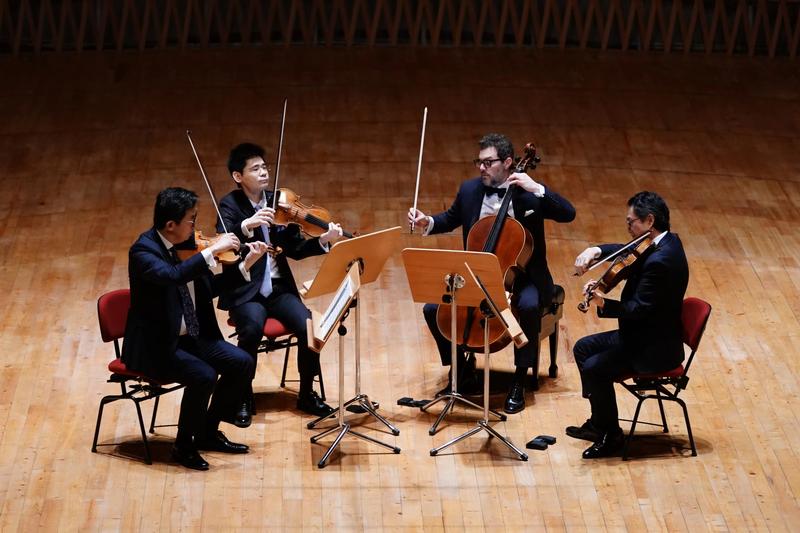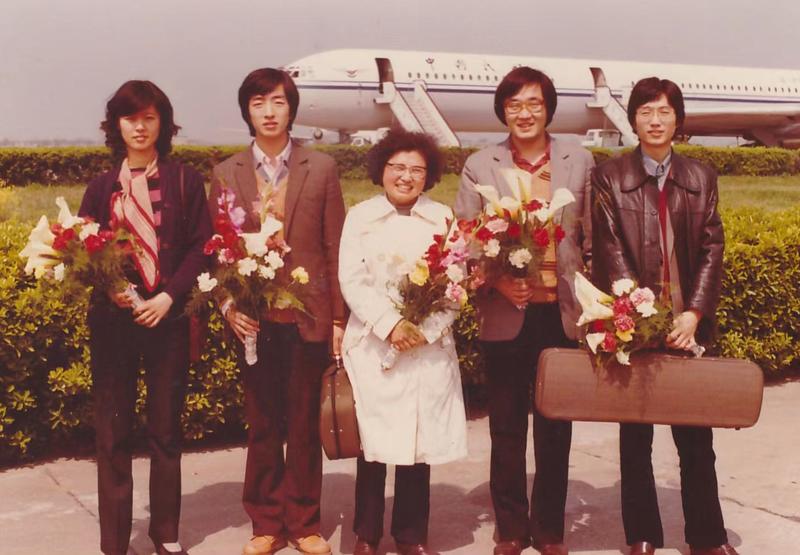 The quartet performs at the Shanghai Symphony Hall on Sunday to mark its 40th birthday. (PHOTO PROVIDED TO CHINA DAILY)
The quartet performs at the Shanghai Symphony Hall on Sunday to mark its 40th birthday. (PHOTO PROVIDED TO CHINA DAILY)
The Shanghai Quartet kicked off its 40th birthday celebrations with a concert at the Shanghai Symphony Hall on Sunday.
One of the first chamber groups in China, the quartet, which, in the beginning, consisted of four students from the Shanghai Conservatory of Music, was founded in 1983. The group has since then played around 3,000 concerts in 35 countries and regions, and recorded more than 30 albums.
"Never did we think we could have carried on for so many years," says violinist Li Weigang, who is one of the founding members of the group along with his elder brother Li Honggang. The other two current members are cellist Nicolas Tzavaras from the United States, who has been with the group for 25 years, and Chinese violinist Yu Xiang, who joined the group in 2021.
Back in the 1980s, chamber music was rarely performed in China, and it was the former Ministry of Culture that suggested the country's leading music conservatories set up student chamber groups to prepare for an international competition that was to be held in 1985 in Portsmouth in the United Kingdom.
"We thought we would travel abroad, have the competition and that would be it," Li Weigang recalls. "But the jury and a music teacher were so impressed by our performance that they said it would be a pity if we disbanded after the competition."
The quartet later applied for scholarships and went on to study in the US before embarking on a long performing career and becoming one of the most renowned chamber ensembles in the world.
While the Li brothers remain as the core of the ensemble, cellist Tzavaras has been in the ensemble longer than any other musician.
Although the quartet bears the name of its home city in China, Tzavaras says, "We are in reality an international group with Chinese cultural heritage, and American and European influences".
 The Shanghai Quartet's first four members with their coach Ding Zhinuo (middle). (PHOTO PROVIDED TO CHINA DAILY)
The Shanghai Quartet's first four members with their coach Ding Zhinuo (middle). (PHOTO PROVIDED TO CHINA DAILY)
The combination of cultures and the drawing of inspiration from both the East and the West have helped the quartet to grow into a unique chamber group appreciated and respected in different parts of the world, he adds.
Yu, the first prizewinner of the 2010 Yehudi Menuhin International Violin Competition, used to play in a student quartet when he attended the middle school attached to the Shanghai Conservatory of Music.
"I am honored to join the Shanghai Quartet, and feel it's part of my duty to let more young people fall in love with chamber music," he says.
Professor Ding Zhinuo, a member of China's first female chamber group, was the coach of the quartet when it prepared for the Portsmouth competition. She attended the rehearsal of the quartet last week and praised the group for their persistence over the last 40 years.
"I hope they will lead China's chamber music to further development and a better future," she says.
The Li brothers were born into a family of musicians in Shanghai. Growing up near today's Shanghai Symphony Hall and the Shanghai Conservatory of Music, they started their music training at a young age as their mother, maternal grandfather and an uncle all used to be members of the Shanghai Symphony Orchestra.
The father had great ambitions for his sons, and especially wanted Li Weigang to attend international competitions and pursue a career as a soloist.
However, once they started to play chamber music, Li Weigang found it more fun than playing solo. "It was more colorful and simply better music," he says.
The brothers later studied four pieces in preparation for the Portsmouth competition, which have become part of their repertoire since. One of the pieces is Beethoven's String Quartet No 16.
"We picked that piece because it was short, and we thought it would be easier," Li Weigang says. "But it was in fact one of the most philosophical pieces composed not long before Beethoven died. Beethoven is our favorite composer and we are still playing the piece today, but it has never been easy."
The group has over the years built close ties with the Shanghai Symphony Orchestra, performing 17 concerts at its venue since the launch of its new concert hall in 2014. In July, the Shanghai Quartet will head to Guangzhou, Guangdong province, where they will hold four concerts and play 13 musical pieces, from classical compositions to newly commissioned pieces by Tan Dun and Zhou Long. In October, the ensemble will kick off their 40th anniversary tour of the country.


